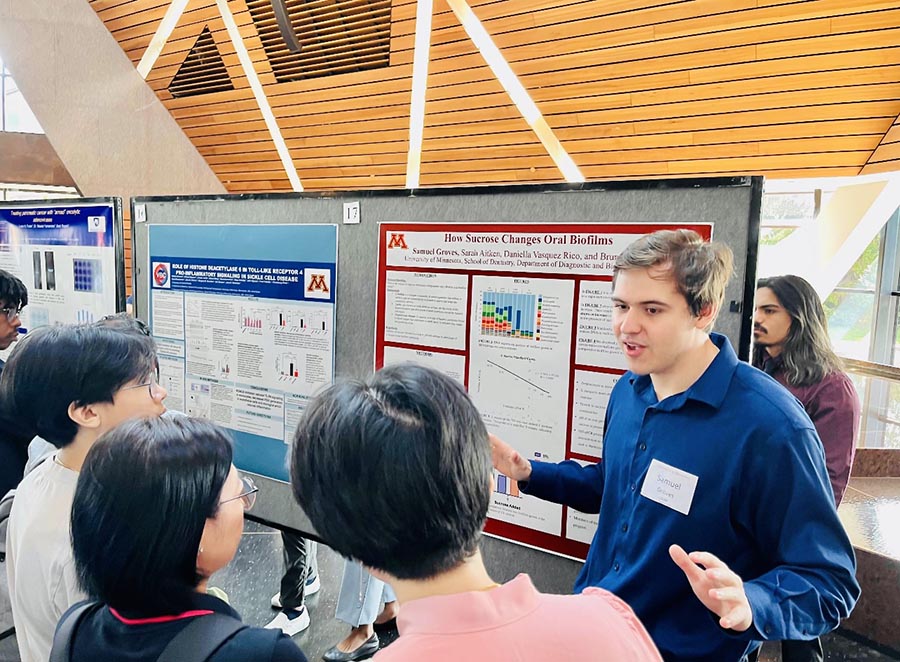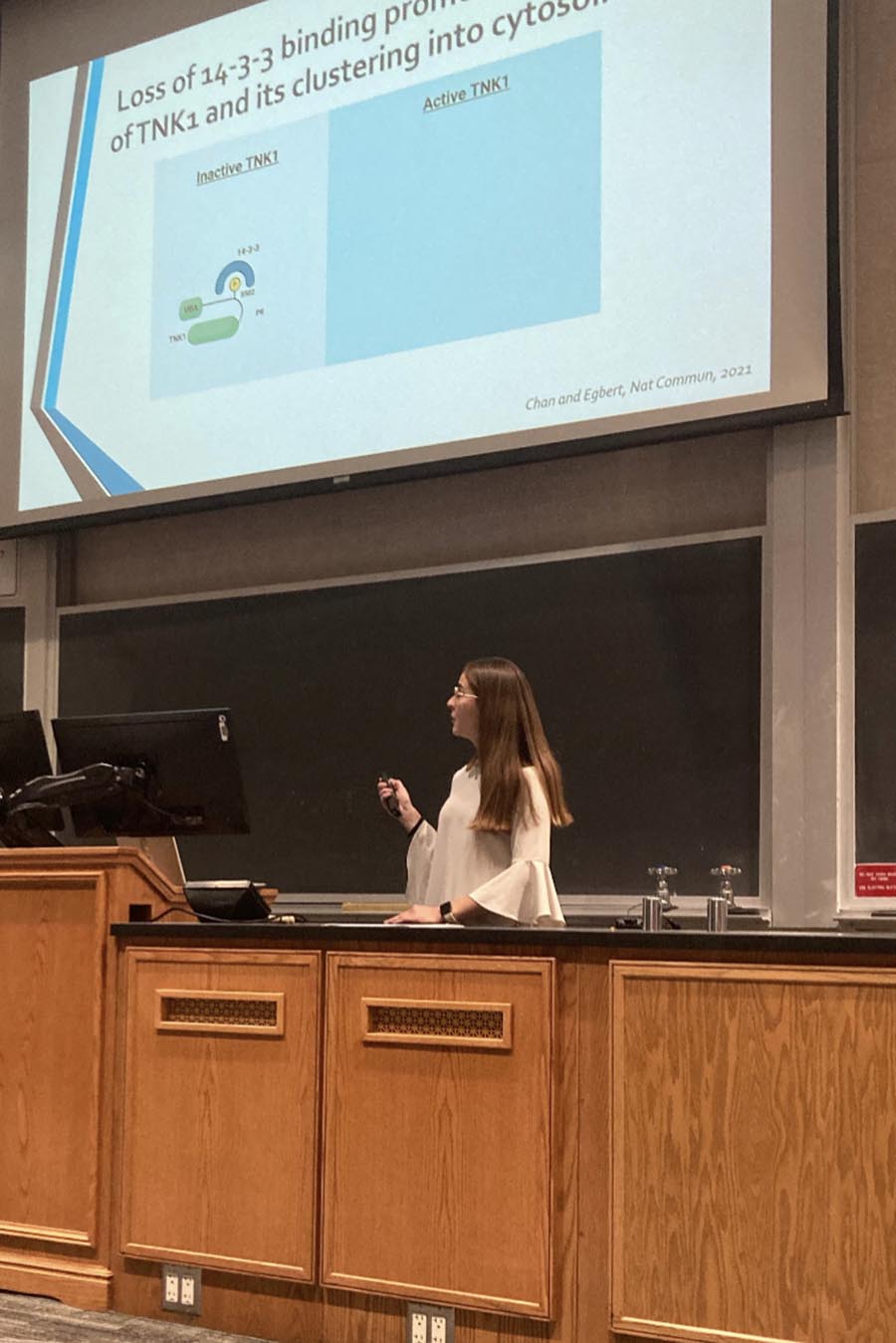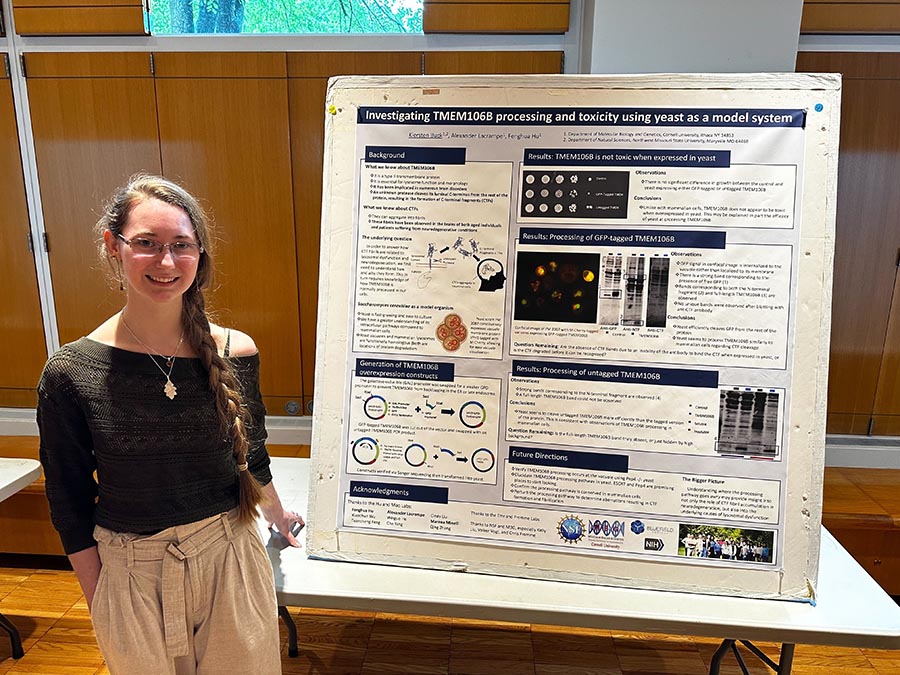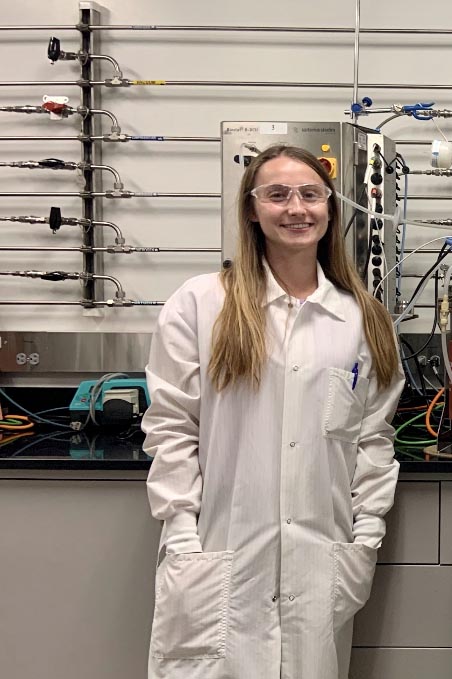More than a dozen science students at Northwest Missouri State University gained profession-based experience and completed research programs throughout the nation this summer, ranging from dental research in Minnesota to studying cancer cells in Utah.
The research programs, which often receive funding from government agencies such as the National Institute of Health and the National Science Foundation, are extremely competitive. Showing the strength of Northwest science programs, students were placed at institutions throughout the country, including University of Minnesota, Cornell University, University of Wisconsin—Madison and University of Missouri—Kansas City as well as nature centers, veterinary clinics and health centers throughout the region.
Faculty in Northwest’s Department of Natural Sciences encourage students to apply for the prestigious research experiences and believe the knowledge students gain is invaluable.
“It’s really satisfying for students to get in the lab and not just learn about science but actually practice science and run their own projects,” Dr. James Campbell, associate professor of biology, said. “You start to feel like a scientist.”
A sampling of Northwest students who completed summer research programs appears below.

Samuel Groves presented the findings of his research at the University of Minnesota. (Submitted photo)
Groves, a senior biomedical sciences major from Liberty, Missouri, participated in the Life Sciences Summer Research Program at the University of Minnesota, specializing in craniofacial and dental research.
With more than 100 applicants throughout the nation for the craniofacial and dental research experience, Groves was one of eight students accepted for the program funded by the National Institute of Health.
Groves spent 10 weeks researching how sugar levels affect bacteria in human mouths. With support from a principal investigator and a mentor, he spent 35 hours every week running tests and conducting experiments in a lab. He explored his interest in cavity-causing bacteria by applying different amounts of sugar to the bacterium and studying its effects.
His time in the lab allowed him to work independently, and he had the opportunity to freely experiment with new techniques and equipment.
“I was given the tools that professionals use, and they expected me to run these very expensive machines on my own,” Groves said. “They gave me the responsibility, but they also trusted me to do it.”
Having spent the summer making connections, developing presentation skills and experiencing what working in a lab is like, Groves expanded his network and his understanding of research as a profession.
“I never really had research experience in general, so it broadened my perspective on what I want to do,” Groves said. “It’s really good for building a network and lifelong friendships.”

Angela Per Moreno completed a research program at Brigham Young University. (Submitted photo)
Per Moreno, a senior biochemistry major from Saragossa, Spain, completed a research program at Brigham Young University in Provo, Utah.
In collaboration with fellow undergraduate and graduate students, Per Moreno worked in a cancer research lab and was tasked with researching TNK1 proteins and its role in cancer development. She examined how TNK1 reached other proteins that send inflammatory signals to the body.
During the course of her research project, Per Moreno was introduced to new practices and lab techniques.
“I did a lot of cell culture, immunoprecipitation, PCRs, western blots,” Per Moreno said. “I also learned to interpret the data that we were getting.”
As she neared the end of her time at BYU, Per Moreno even uncovered new information about how TNK1 proteins travel through the body.
“The thing that I am most proud of from this experience is that I discovered something that nobody ever had,” Per Moreno said. “Once we found it, I felt that all the hard work we put into it was really worth it.”
After her experience, Per Moreno has a stronger interest in research as a career and hopes to continue her work in cancer research.

Kiersten Buck completed a research program at Cornell University. (Submitted photo)
Buck, a junior nanoscience major with an emphasis in chemistry and biology from Kansas City, Missouri, completed a research program at Cornell University.
Buck’s program was funded by the National Science Foundation, and she worked in Cornell’s Department of Molecular Biology and Genetics. Buck was among 11 students accepted to the program from about 700 applicants.
Focusing her research on investigating a human protein, Buck spent much of her time in the lab practicing the technique of restriction cloning. Because she was tasked with manually separating and attaching fragments of DNA, using restriction enzymes and DNA ligase, Buck had to be patient and observant when conducting her work.
“Scientific research takes time, and I knew that on a logical level going in,” Buck said. “But knowing something and experiencing it are two completely different things.”
Buck, who hopes to attend graduate school and later begin a career in research, believes that her experience at Cornell provided her with hands-on training and an inside look at what this line of work is like.
“It was a great experience, especially the amount of autonomy I had in the lab,” Buck said. “Yes, I did have my lab mentor, but I was doing a lot of projects on my own, day in and day out.”

Alexandria Gilbert conducted animal vaccine research and development during an internship with Merck Animal Health. (Submitted photo)
Gilbert, a senior general biology major from Omaha, Nebraska, interned at Merck Animal Health.
Working alongside scientists and doctors, Gilbert spent her internship experience in animal vaccine research and development, specifically on the poultry team.
She participated in the development of a virus neutralization procedure, which allowed her to get hands-on experience in neutralization practices, virus dilutions and problem-solving in a lab setting.
Gilbert’s exposure to lab research gave her new skills that she believes will be useful to her in any science career.
“I think I got a lot of valuable lab experience,” Gilbert said. “I’m also passionate about the environment, so I can see myself taking the lab skills I got there and using that for research in wildlife health.”
Having taken courses in biology and biotechnology, Gilbert felt prepared to be in the lab, but the opportunity to apply her knowledge in a real-world setting gave her advanced knowledge about the field of scientific research that she had not been exposed to before.
“It helped me get more comfortable in the lab, and now I know that it is something I can see myself doing,” Gilbert said. “I’m just glad I got to be in the industry, because now I kind of know what that’s like.”